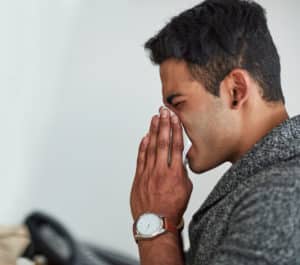Nasal Polyps (Endoscopic Polyp Removal) in Austin, TX
What are nasal polyps?
 Nasal polyps are soft tissue growths that form in the nasal cavity and the sinuses. They typically form as a response to a sinus infection, nasal allergy, or both. Polyps will start small which is called “polyploid degeneration” of the lining and may progress to be large visible masses that fill the nasal and sinus cavities.
Nasal polyps are soft tissue growths that form in the nasal cavity and the sinuses. They typically form as a response to a sinus infection, nasal allergy, or both. Polyps will start small which is called “polyploid degeneration” of the lining and may progress to be large visible masses that fill the nasal and sinus cavities.
What are the Symptoms of Nasal Polyps?
Nasal polyps produce severe congestion, mouth breathing, and snoring. They are also typically associated with chronic and recurring sinus infections. Other common symptoms include the following:
- Runny Nose
- Postnasal Drip
- Constant stuffiness
- Congestion
- Nasal blockage
- Mouth Breathing
- Snoring
- Sinus Pressure
- Drainage
- Sinus Infections
Read Blog Post: What Are Nasal Polyps
What is an Endoscopic Polyp Removal?
Removal of nasal polyps used to be an extensive procedure. Now, with modern endoscopic techniques, they can be safely removed as an office procedure. In our office, under IV sedation, a small telescope is used to visualize the polyps and a special suction instrument can be used to vacuum the polyp away. This is typically done in conjunction with balloon sinuplasty and a sinus wash to clear the associated sinus infection.
Dr. Daniel Slaughter explains what it means to have nasal polyps and how it can be treated at Sinus & Snoring Specialists.
Why is Endoscopic Polyp Removal Performed?
Typically as part of a balloon sinuplasty procedure under IV sedation in our office, the polyps are removed. This is done using a tiny 4mm nasal endoscope connected to a camera. A special instrument called a suction microdebrider is used to vacuum the polyps away. This opens the nasal airway and provides access to the sinus outflow tracts for balloon sinuplasty. This clears the symptoms that polyps cause as detailed above.
How Do I Prepare For Endoscopic Polyp Removal?
Our patients are given a thorough endoscopic exam and a mini-CT scan in our office so we can review the extent of the polyps. Patients will be given a date for their office procedure and they will be instructed to arrive without eating or drinking for a time interval before the procedure. The process takes about 15 minutes and patients can typically go home about 15 min after the procedure.
What causes polyps in the nose?
Polyps result from chronic inflammation in the nose and sinuses in people with a genetic predisposition to polyp formation. Allergy or infection may produce polyps in these individuals. Structural problems in the nose also increase the likelihood of polyp formation.
What foods make nasal polyps worse?
In people with significant allergies to pollen and/or food exposure to these items may increase the likelihood of polyp formation.
Alternative Treatments for Nasal Polyps
There is no long-term medical treatment for nasal polyps. High-dose oral steroids can temporarily reduce them but they recur and this treatment has many side effects. On the other hand, once the polyps have been removed there are medical therapies that are effective in preventing their recurrence. First and most important is the successful resolution of sinus infection. This is why balloon sinuplasty is important along with the removal of the polyps. Balloon sinuplasty has a 98.6% success rate in resolving chronic and recurring sinusitis by allowing the sinuses to drain normally. Secondly, it is critical to have successful allergy management. To that end, we will always do allergy skin testing in our office to identify the patient’s allergies and use allergy drop therapy to teach their immune system to block their allergies.
Dupixent is a prescription medicine used to prevent the recurrence of nasal polyps in those 18 years and older. It is a biological medication that targets the specific part of the immune system that leads to polyp production. Sublingual immunotherapy with allergy drops and Dupixent work by targeting different pathways in the immune system, and therefore work best in combination to provide comprehensive coverage for the prevention of nasal polyps. Dupixent is given as an injection under the skin twice a month in the thigh by the patient at home. If prescribed, you will be shown in the office how to administer the injection.
Can you pull out nasal polyps at home?
Removal of polyps is a surgical procedure and needs to be done in conjunction with resolving the underlying structural issues that may exist in the nose along with clearing any associated infection.
Can the polyp return after treatment?
In most cases, the polyps will not return if we are successful in also clearing the sinus infection and managing allergies. In some rare conditions, the polyps tend to recur and may need regular removal over time. Fortunately this removal each time involves minimal discomfort and fast recovery. Allergy drop therapy and new biologic therapy such as Dupixent can greatly reduce the risk of recurrence.
What is the Recovery from a Polyp Removal Procedure?
The patient will have a cold-like sensation for a few days and 1-2 days of bloody nasal discharge. Most patients do not require pain medication and will work the day after the procedure.
How painful is nasal polyp surgery?
Removing nasal polyps, correcting underlying structural issues, and clearing the sinuses can be done as a simple 15-minute office procedure under IV sedation. Patients will typically not require any pain medication and can work the next day. In our office, there is no packing required.
Is it worth having nasal polyps removed?
Resolving nasal polyps either through medical treatment or surgical removal is critical to breathing well and having sinus health.
Patient Testimonials
“Friendly, professional staff that work hard to provide the best experience for all their patients. I
had a balloon sinuplasty performed by Doctor Slaughter and his team and I couldn’t be happier with the results! The results were immediate and the recovery took only a couple days! If you have been on the fence about going to better your sleeping/general breathing situation please
do yourself a huge favor and visit Sinus and Snoring! So grateful for the whole team and their
enthusiasm to provide genuine patient care! “ – L.E.“Dr. Slaughter is simply the kindest and professional doctor I’ve seen in a long time. He
absolutely makes you feel important and not only listens to you, but explains everything in a way
that’s easy for a patient to understand. Absolutely Recommended” – T.B.“Really appreciated the entire staff. Very knowledgeable and efficient, but also warm and
friendly. Exactly what I want when I visit a medical professional!” – M.W.
Schedule a consultation
If you are interested in learning more about endoscopic polyp removal and would like to see if you are a good candidate, contact our office in Austin, TX today! Call (512) 601-0303 to schedule a consultation with board-certified ENT Specialist Dr. Daniel Slaughter.

